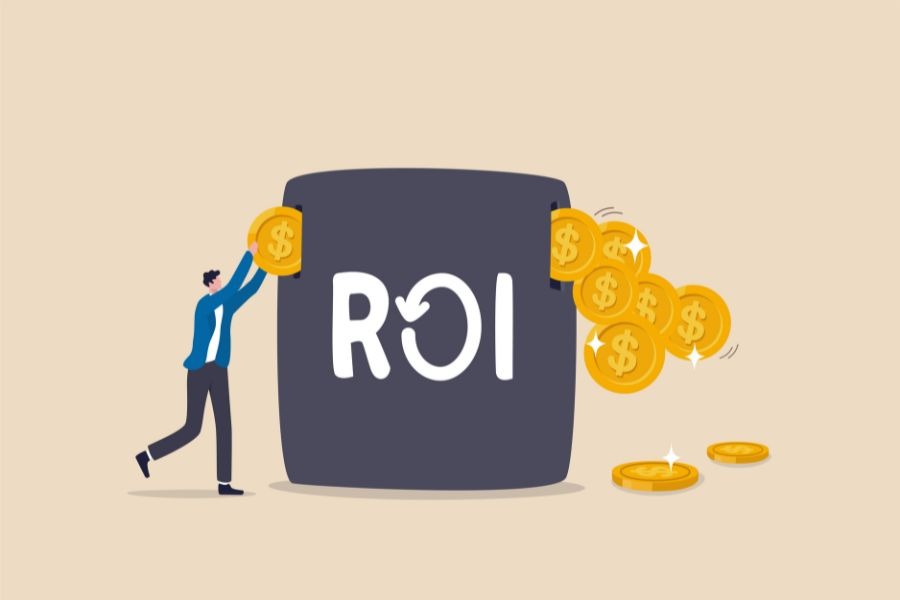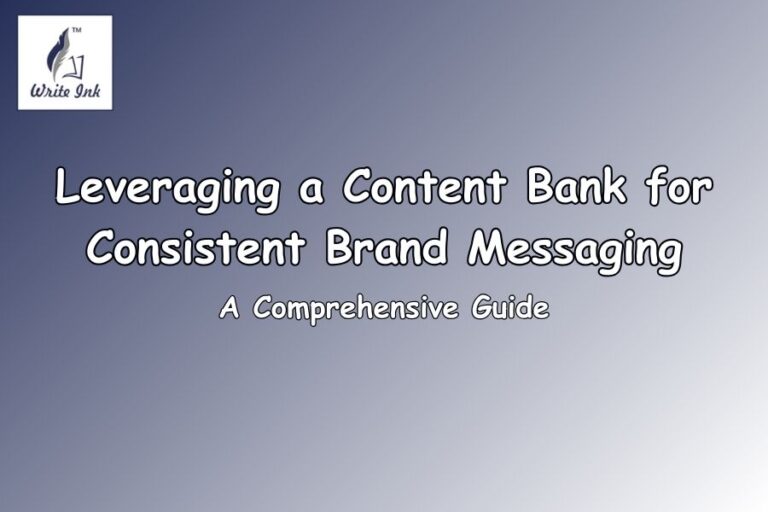Unlocking the Potential of Your Digital Storefront: How to Create Effective Website Content that Converts
Introduction

Did you know that 93% of purchase decisions begin with websites? Moreover, 75% of consumers judge a business’s credibility based on its website.
In today’s digital age, a well-crafted website is the cornerstone of a successful online presence and lies at the heart of digital marketing efforts. Acting as a virtual storefront, it introduces your brand to the world and connects you to your potential clients and customers. Building a website for your brand enables you to shape the perception of your brand however you wish to, set yourself apart from other brands in your industry and grab the attention of your target audience.
With its 24-hour availability and super-quick accessibility, it ensures extensive reach, constant exposure and full-time visibility for your brand.
However, merely having a website for the sake of it is not enough; with countless businesses vying for your target audience’s attention, you must invest considerable thought and effort in creating a website that is not only compelling and engaging but also provides value and resonates with your target audience. While eye-catching graphics, aesthetically pleasing design and user-friendly interface are crucial, what makes all the difference is the quality of the website content.
Website content marketing and content SEO constitute the key to boosting brand awareness, establishing credibility and driving conversions. After all, the only way to deliver value through your website is meaningful and strategic content creation specifically meant for your target audience.
Website content can make or break your brand’s online image and success. In this blog, we will explore the intricacies of website content, its impact and significance and how you can leverage it effectively to attract and retain customers, drive conversions and achieve your business objectives. Whether you’re a website content writer or an entrepreneur running your own business, this blog’s practical tips and insights will help you understand the nuances of strategic content writing and learn how to strategise content to establish brand authority through the website. Get ready to create a website content strategy that aligns with your brand personality profile and breathes life into your brand’s digital identity.
What is Website Content?

It’s essential to understand website content meaning before delving into its nitty-gritty. The term’ website content’ comprises all of a website’s textual, visual and multimedia elements. Website content can take various forms – homepage text, images, videos, infographics, blogs, articles, product descriptions, testimonials, user-generated content, FAQs and more.
Essentially, website content conveys a brand’s values, offerings and unique selling propositions to its audience, engages them by providing valuable information and guides them to take the desired actions. It constitutes the digital window representing the brand to the world and the bridge connecting it to its target audience. Just like the display window of a brick-and-mortar shop, a website functions as a virtual storefront to attract, engage and sustain the attention of online visitors.
Why is Website Content Important?

Here are a few reasons why the website content is of utmost importance for your brand’s digital presence –
- First impressions matter: Just like a well-designed brick-and-mortar store attracts more customers, an aesthetically pleasing website with engaging and informative content shapes the visitors’ first impressions of your brand. And especially in the digital world, the first impression is the only impression that matters. If your website fails to hold the interest and sustain the visitors’ attention, they will quickly bounce and move to the following webpage. Valuable, well-written and engaging content is the only way to make visitors stay on your website and explore it further.
- Brand identity, trust and credibility: Creating a website with relevant and high-quality content is a guaranteed way to shape your brand identity, showcase your expertise and establish authority in the industry. When you create authentic content and deliver valuable information that aligns with your brand consumer profile, your brand becomes a credible source for your target audience. When visitors realise your brand understands their needs and can provide solutions, they will trust your brand and opt for your products or services.
- SEO and visibility: The quality of your website content is what determines its search engine rankings and reach. Search engines like Google always prefer websites with relevant, valuable, high-quality content. Strategic content planning with thoughtful keywords, informative SEO blog writing and multimedia elements will enhance your website’s visibility in search engine results and drive organic traffic to your site.
- Engagement, user experience and retention: Merely attracting visitors to your website is not enough – you must also make them stay and explore your site further. Well-crafted content keeps the visitors on your site longer, encouraging them to learn more about your brand and offerings and prompting them to take the desired actions. By providing a user-friendly and customer-oriented experience, thoughtfully curated content boosts audience engagement and reduces bounce rates.

- Conversions and ROI: The ultimate goal of your website is to convert first-time visitors into customers or leads. Effective website content guides the visitors through their buying journey, from awareness and consideration to action and conversion. A website with high-quality content and persuasive copy is the key to achieving a higher ROI and accomplishing your business objectives.
- Brand awareness: Website content is fundamental to enhancing your brand’s awareness among the public. It educates your target audience about your products or services and guides them to take the desired actions.
- Differentiating your brand: Unique, authentic and original website content helps you create a distinctive identity, stand out from the competition and leave a memorable impression on your audience.
Your website is the most significant point of contact between your brand and its target audience. Creating an exceptional website with compelling and engaging content is the best opportunity to connect with your potential customers and leave a lasting impression on their minds, driving conversions and achieving your business objectives.
How to Write Website Content?

Now that you’ve understood the meaning and significance of website content, it’s time to learn how to write it effectively. When creating impactful website content, the importance of content strategy and a well-thought-out approach considering your target audience and business objectives can’t be understated. Here’s a step-by-step guide to creating compelling website content from the viewpoint of an expert and strategic content writer –
1) Understand your audience: The first step of writing website content is understanding your target audience’s needs, concerns, pain points and preferences. Conduct thorough market research and gather insights into your target audience’s demographics (details like age, gender, location and profession), psychographic information (details like values, desires, interests, hobbies, goals, lifestyle choices and motivations) and the challenges they face. Try to learn about their preferred content formats (whether they prefer long-form blogs, short informative posts, videos or infographics) and tones (whether they like a casual and conversational style or a formal and assertive tone). Create detailed buyer personas for different segments of your target audience and let them serve as a roadmap to tailor your writing style and content to resonate with them.
2) Set clear and specific goals: Define the objectives you want to accomplish through your website content, whether to drive sales, generate leads or enhance brand awareness. Based on your primary purpose, you must also establish specific goals for each content piece you intend to publish on your website, like a blog, product description, or landing page – do you want to inform, entertain, or persuade the audience? Your content planning and optimisation efforts must align with these goals.
3) Define your brand’s voice and messaging: Ascertain the tone and style representing your brand to the target audience. Craft a productive, clear and concise brand message that resonates with the different segments of your target audience.
4) Create a content strategy and plan: You must know how to create a content strategy and implement content planning tips for effective website content. Outline the website content structure and topics, including the homepage, product or service page, blog posts, FAQs, and more. Compile a content calendar encapsulating the content formats and publishing schedules. Your content must guide visitors through the buyer’s journey and align with your marketing goals and business objectives.
5) Industry research: Conduct thorough research on the trending topics in your industry and competitors’ content. Find reliable sources to cite and seek inspiration from to create valuable, engaging and informative content.
6) Craft attention-grabbing headlines: Headlines are the gateways between your content and the website’s visitors. They determine whether the audience will read your content or skip it. Create attention-grabbing, concise and descriptive headlines that convey the essence of your content and entice readers to explore your brand and website further. Experiment with headline formulas, variations and techniques to gauge what resonates best with your audience. Employ powerful words, emotional triggers, numbers, and intriguing questions to evoke emotions and curiosity in the audience. Your headlines must resonate with your target audience’s interests, needs, and pain points.
7) Write compelling and engaging content using copywriting principles: Once you’ve captured visitors’ attention with the headlines, you must keep them engaged with well-written, informative, engaging, relatable and easy-to-read content. Use a conversational tone and language to articulate your brand’s USPs. Incorporate storytelling to hold the interest of your audience and evoke emotional responses. Emphasise the benefits of your product or service rather than just listing the features. Craft compelling narratives and persuasive calls to action (CTAs) that align with your brand message and values. Experiment with different CTA styles, lengths, tones and placements to optimise engagement and conversions. Showcase real-life examples and provide social proof through testimonials, reviews, and case studies.

8) Optimise the content for SEO: Conduct keyword research to find long-tail keywords and seed keywords that broadly describe your product or service and are specific to your niche/industry and the interests of your target audience. Identify the terms your audience is searching for and keywords targeted by your competitors. Try discovering as many high-traffic, low-competition keywords relevant to your industry as possible. Incorporate the relevant keywords naturally in your content to improve its search engine visibility. Utilise SEO content ideas, SEO content checkers and SEO content tools like Google Search Console, Google Analytics, Moz Pro and SEMrush to improve your content’s overall SEO. Avoid keyword stuffing since it can adversely impact the user experience and SEO rankings.
9) Incorporate multimedia elements to enhance the content’s visual appeal: Use high-quality and aesthetically pleasing images, videos, infographics, and interactive features relevant to your content and reinforce your message. Visual elements accompanying the text help improve the user experience and leave a lasting impression.
10) Organise and format your content logically to ensure easy readability and accessibility: The content on your website must be organised coherently, allowing easy navigation and readability on all devices. Break up text with headings, subheadings, bullet points, and images. Use headings and subheadings effectively to guide the readers through the text. Incorporate bullet points and numbered lists to present information clearly and concisely.
11) Proofread and edit: Typos and grammatical errors in the website content can weaken your brand authority and credibility. Therefore, you must edit and proofread your content thoroughly before publishing it. Edit for clarity, coherence, conciseness and consistency in tone, style and brand voice throughout the website. Utilise tools like Grammarly or Hemingway Editor to ensure your content is error-free and well-written.
12) Regularly conduct a content audit for the website and refine your strategy accordingly: Review your content and evaluate its performance by conducting a content quality audit over regular intervals. Refine your content strategy frequently per the data-driven insights and user behaviour to maintain the relevance and accuracy of your content. Conduct A/B tests to compare content variations and determine what resonates best with your audience. Identify content gaps, missed opportunities and areas for improvement and capitalise on them to elevate your content performance and increase conversions.
By meticulously following the above steps, you can create compelling website content that engages your potential customers and drives tangible successful outcomes for your brand.
What are the types of content?

Website content comes in several forms and types, each serving a distinct purpose in informing and engaging your target audience. Here are some common types of website content that you can incorporate into your website for a well-rounded digital presence –
Homepage content: The homepage is the digital front door of your website that introduces your brand to the world. The homepage content encapsulates a concise and engaging overview of your brand’s offerings, mission and unique value proposition to grab the visitors’ attention, effectively communicate your brand identity and make a compelling first impression. The homepage content of all successful websites showcases why brand positioning is important right from the website’s initial view.
About Us page content: The ‘About Us’ page provides a deeper insight into your brand’s history, vision, mission and values. Authentically sharing your brand’s story, milestones, achievements and team in this space helps humanise your business to foster a personal connection, trust and rapport with your audience.
Product or Service page content: Detailed descriptions and specifications of the products or services your brand offers constitute one of the most vital facets of its website. This content should employ descriptive language to elucidate features, benefits and unique selling points, enabling the visitors to make informed decisions. You must focus on how your products or services would make the lives of your target audience easier to make a persuasive case and compel them to take the desired action.
- Blog post content: Blogs are well-researched, informative and engaging articles that deliver valuable information, industry insights and solutions to your target audience. Creating SEO blog content is the most efficient way to showcase your expertise, build your brand’s authority, drive organic traffic and become a reliable resource for your audience. The SEO blog strategy must incorporate SEO blog topics that effectively address the target audience’s pain points and provide solutions.
- Landing page content: Landing pages are designed for marketing campaigns and promotions. These pages have a clear goal and focus and are intended to attract more traffic and boost conversions. Landing page content comprises compelling headlines, persuasive copy, powerful CTA and attention-grabbing visuals to encourage visitors to take a specific action and convert them into leads or customers.
- FAQ content: The FAQs (Frequently Asked Questions) address the common queries and concerns of your target audience and potential customers, helping them find quick answers. The FAQ section is an often underutilised but optimal way to help visitors find quick answers, reduce the need for customer support, ensure a user-friendly experience and streamline their decision-making process.
- Testimonials and reviews: User-generated content in the form of testimonials and reviews is an infallible and foolproof way to build trust and credibility. The feedback from satisfied customers also functions as social proof, further enhancing the perception and identity of your brand.
- Case study content: Case studies showcase real-life examples of how your product or service has solved your customers’ problems, substantiating your brand’s expertise and competence. Case studies build credibility, provide social proof and educate your potential customers on how your offering can solve their problems and fulfil their needs, driving more conversions.
- News and updates content: A section dedicated to company news, events, and industry developments keeps your audience well-informed. It also exhibits your commitment to being transparent and relevant.
Different content types work together to engage the visitors, guide them through your website and encourage them to take specific actions. Consider and evaluate your target audience’s preferences and the brand’s business objectives before deciding what content types to incorporate into your website.
What Makes Good Website Content?

Creating good website content goes beyond merely filling the space on your site with text, images and shallow or superficial content. With technological developments like Web 3.0 content, engaging and resourceful content that delivers substantial value to the audience is indispensable to establish your brand as a reliable resource and keep the audience coming back to your website. Your content strategy planning and content writing plan must incorporate content that informs and engages your target audience meaningfully and purposefully, compelling them to take the desired actions and driving conversions. Let’s have a closer look at the common characteristics of effective and valuable website content –
- Relevant to the target audience: Good content aligns with the needs, interests, pain points, preferences and expectations of the brand’s target audience. It successfully addresses and provides solutions to their concerns, queries, questions and challenges. Content that is relevant and resonates with the target audience is much more likely to drive conversions.
- Clear and concise: Good content conveys information clearly and concisely that is easy to understand. It ensures that your intended message is communicated to your target audience precisely and efficiently for a user-friendly experience. Complex language and excessive technical jargon, on the other hand, may alienate and confuse your audience.
- Consistency: Good content maintains a consistent tone, style and brand voice throughout the website to build trust and familiarity with the audience. Moreover, aligning the website content with the brand’s social media content strategy across different platforms facilitates a recognisable and cohesive brand identity.

- Engaging and persuasive: Good content employs storytelling, compelling headlines and interactive multimedia elements to capture and sustain the audience’s attention. By engaging their interests, effective content keeps the visitors on your website for a longer duration, prompting them to take specific actions and increasing the likelihood of conversions.
- Valuable: Good content provides tangible value to the audience to make their lives easier and better. It offers helpful information, insights and solutions that align with the audience’s pain points and can’t be found easily elsewhere. Visitors are bound to return if a website presents this information engagingly and entertainingly.
- Optimised for SEO: Good content is optimised for the search engines to boost the website’s visibility and discoverability. It incorporates SEO content writing, SEO-friendly blogs, strategic use of relevant keywords, appropriate formatting, attention-grabbing headings and meta descriptions to attract organic traffic and improve click-through rates.
- Exhibits expertise and authority: Good content demonstrates your brand’s expertise and authority in its industry or niche, inspiring trust and loyalty from the audience.
- Unique and authentic: Good content is unique and authentic. It provides perspectives, insights and solutions that set your brand apart while being genuine, sincere and transparent in communication with the audience.
- Audience-oriented: Good content is consumer-centric and prioritises the audience’s needs and preferences over the brand’s self-serving promotion.
- Has a well-defined end goal: Good content is characterised by a clear and precise objective like boosting brand awareness, generating leads or driving sales.
- Fresh and up-to-date: For the content to remain relevant to the evolving needs and preferences of the audience, it must be regularly updated and refined. You must consistently monitor the performance metrics of your content and optimise it accordingly for better results.
- Visually appealing: Good content must be accompanied by multimedia elements like high-quality images, videos and graphics that are visually appealing and effectively complement the content’s subject matter.
- Mobile-friendly and accessible: Valuable content must be easily accessible and readable on all devices, especially mobile phones and tablets. The formatting and arrangement of headings, bullet points, multimedia elements and whitespace should enhance readability. An organised and logical website content format is as important as creating quality content.
By ensuring that your website content embodies the above-listed characteristics, you can bolster your brand’s online presence to a great extent.
Conclusion

A website is more than just words on a webpage – it’s the bridge that connects your brand with its consumers and a 24/7 brand ambassador. It facilitates your branding content strategy, attracts and engages your target audience, builds trust and credibility, establishes authority in the industry, boosts brand awareness, drives conversions, leaves a lasting impression and represents your brand’s unique value proposition to a global audience.
Website content constitutes a powerful digital marketing tool and the most influential advertising strategy of the 21st century. Writing a content strategy and creating valuable content for your website is a meticulous process that considers your target audience’s needs, expectations, pain points, brand profile design, and business objectives.
Content planning and writing for your website are not one-time tasks. As the needs and preferences of your target audience change and evolve, your website must also evolve and adapt to them. Website content creation is an ongoing and dynamic task that requires consistent monitoring, analysing and optimising based on data-driven insights and user response/ feedback to stay relevant in the fast-paced and ever-changing digital landscape.
Effective website content leads to new opportunities and lasting value and is a budget-friendly marketing tool, especially for small businesses. Given its importance and impact, you invest significant thought, time and effort in creating and optimising the content of your brand’s website.
When it comes to a high-performing website that yields tangible results for your brand and business, it’s best to leave it to the professionals of a content creation agency with expertise in website content and SEO. Investing in professional website content services will yield abundant returns for your business in the long term.
Write Ink boasts years of experience and expertise in creating valuable, authentic, resourceful, exceptional and engaging website content to strike a chord with your audience and make your brand skyrocket. Contact us today for website content writing services specifically curated to align with your target audience and meet your objectives. We offer various content services like website content writing, SEO content strategy, SEO blog articles, B2B content strategy, social media content plan, social media content writing, social media content ideas, brand profiling and content audit services. Visit our website for more details.
Image Reference: Freepik







